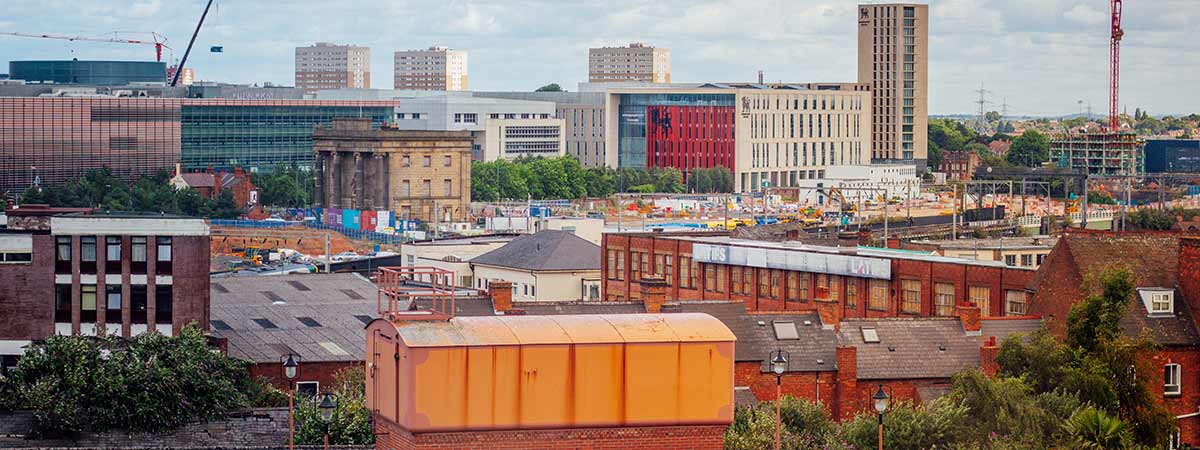
Real Estate - BSc (Hons)
Currently viewing course to start in 2025/26 Entry.
Want to enter the exciting world of property? Discover our BSc (Hons) Real Estate course. This degree is for you if you are interested in the study of the built environment and in the acquisition, disposal, management and valuation of land and buildings....
- Level Undergraduate
- Study mode Full Time
- Award BSc (Hons)
- Start date September 2025
- Fees View course fees
- Subject
- Location City Centre
This course is:
Available with Professional Placement year
Open to International Students
Overview
Birmingham is the second largest city in the UK and is a great area for students to be in if you want to be in the built environment because there's redevelopment going on all around you and there's also a strong possibility that you could be working on these projects in the future. I've had a really good experience at BCU so far. We get to go on quite a lot of site visits. One of the biggest ones we've been on so far was the housing development by Taylor Wimpey, and we also had for our first assignment Taylor Wimpey's, managing director of the West Midlands, assessed one of our presentations. Support from lecturers is really, really good that always there, they're always there to reply to your emails no matter what the query is. They've all had real life experience, academic and industry wise, that we can learn from. One of the things that I'm most passionate about the built environment is the possibility of working on the creation of the built environment that we live in. I wanted a change of career. I wanted to do something that's a bit more impactful and something that can help the community. So I think the built environment was a perfect way to go about the student experience has been amazing, to be honest. The lecturers and the students actually have been very welcoming. There's definitely something for every person to get involved in. The Careers+ and Employability team and the support that I got from them with regards to updating my CV, get my professional network set up on LinkedIn, which has been excellent. So I was lucky enough to secure a placement with Atkins. After my placement year, I was actually offered the graduate role, which was fantastic because it meant that I've got something secured and now go back into industry and into a company that I really enjoyed working with.
It's only four years for me to change my career and really step into a brand new industry. And I'm really thankful for BCU for supporting me through this journey. There's always been something about buildings that has interest in me, kind of curious and how they're put together and what kind of technology goes into that. Coming to university, I knew that I wanted to go to Engineering or Architecture and seeing those courses in depth, I kind of knew to myself that it wasn't correct for me. So then I came across Architectural Technology and I found out it just answered both of those questions I had then, which was wanted to go to. So BCU offers a wide range of facilities. It provides a lot of equipment such as VR headsets, laptops that students can borrow whenever they need to, and industry level software such as AutoCAD and Revit to really useful to us as being used as currency in our industry and will continue to be used throughout the years to come. Being able to go outside of the classroom and use industry level equipment really helps us as students get a vision of what it's like in practice. I've really enjoyed my time studying at BCU and I can't wait to what the future holds.
Want to enter the exciting world of property? Discover our BSc (Hons) Real Estate course. This degree is for you if you are interested in the study of the built environment and in the acquisition, disposal, management and valuation of land and buildings.
This real estate course has been developed in the UK in accordance with the requirements of Royal Institution of Chartered Surveyors (RICS), the leading international professional body for surveying, our course meets the needs of potential employers in the public, private and third sectors. You will complete your undergraduate degree with the most current and relevant insights.
What's covered in this course?
You will gain a detailed understanding of real estate, alongside learning to make an expert analysis of the processes of its ownership, development, occupation, valuation and management. You’ll also examine economics and finance, property valuation and management, development, construction, urban planning and law, ensuring you are equipped with the attributes you’ll need for a successful career.
The course integrates technological, financial, legal and management issues, and you will connect the theories and practice of real estate to a range of real-life case studies, helping you understand the complex world of property.
We will prepare you for a career in real estate, developing your collaborative skills and ensuring you are not only able to practise effectively within the global real estate industry, but that you are also sensitive to the needs of the diverse cultures that you come into contact with in your work.
Especially relevant for the would-be chartered surveyor, this course offers a detailed study of the built environment alongside an expert analysis of the acquisition, disposal, management and valuation of land and buildings.
Benefiting from our staff's close links with industry, the course thoroughly prepares you for the enormously varied work of a general practice surveyor.
Professional Placement Year
This course offers an optional professional placement year. This allows you to spend a whole year with an employer, following successful completion of your second year, and is a great way to find out more about your chosen career. Some students even return to the same employers after completing their studies.
If you choose to pursue a placement year, you will need to find a suitable placement to complement your chosen area of study. You will be able to draw on the University’s extensive network of local, regional, and national employers, and the support of our Careers teams. If you are able to secure a placement, you can request to be transferred to the placement version of the course.
Please note that fees are payable during your placement year, equivalent to 20% of the total full-time course fee for that year.
Accredited By
This course is accredited by:
Why Choose Us?
- Accredited course - Fully accredited by the Royal Institution of Chartered Surveyors (RICS), which ensures our course remains fresh and relevant, as well as providing key industry links and insight.
- Subject league table - We are 6th for Land and Property Management in the Complete University Guide 2023
- Employable Graduates - Our graduates have progressed into roles with companies such as; IP Global, Lambert Smith Hampton, CBRE, Cushman & Wakefield.
- State-of-the-art facilities -You'll be studying at Millennium Point, with access to £6.5 million facilities. You will also benefit from high quality equipment and regular site visits which give you a close-up view of professional practice and an industry perspective on your studies.
- Undertake a Professional Placement Year - You can choose to take a one-year work placement between your second and final year, providing you with valuable work experience.
Open Days
Join us for an Open Day where you'll be able to learn about this course in detail, chat to students, explore our campus and tour accommodation. Booking isn't open for this event yet, register your interest and we'll let you know as soon as booking goes live.
Next Open Day: 28 June 2025
Entry Requirements
These entry requirements apply for entry in 2025/26.
All required qualifications/grades must have been achieved and evidenced at the earliest opportunity after accepting an offer to help confirm admission and allow for on-time enrolment. This can also include other requirements, like a fee status form and relevant documents. Applicants can track their application and outstanding information requests through their BCU mySRS account.
Essential requirements
- Standard offer: 112 UCAS Tariff points. Learn more about UCAS Tariff points.
- Accelerate offer: 80 UCAS Tariff points. Find out more about BCU Accelerate.
If you have a qualification that is not listed, please contact us.
Fees & How to Apply
UK students
Annual and modular tuition fees shown are applicable to the first year of study. The University reserves the right to increase fees for subsequent years of study in line with increases in inflation (capped at 5%) or to reflect changes in Government funding policies or changes agreed by Parliament. View fees for continuing students.
Award: BSc (Hons)
Starting: Sep 2025
- Mode
- Duration
- Fees
- Full Time
- 3 years
- £9,535 in 2025/26 ✱ Important note for this price
- Apply via UCAS
(↩Back to price) * The Government is proposing to increase the cap on full-time regulated tuition fees to £9,535 for 2025/26 and the University is planning on increasing fees to that maximum level once legislation is enacted. Part-time fees are charged pro-rata, where applicable.
International students
Annual and modular tuition fees shown are applicable to the first year of study. The University reserves the right to increase fees for subsequent years of study in line with increases in inflation (capped at 5%) or to reflect changes in Government funding policies or changes agreed by Parliament. View fees for continuing students.
Award: BSc (Hons)
Starting: Sep 2025
- Mode
- Duration
- Fees
- Full Time
- 3 years
- £17,690 in 2025/26
Part-time study
The part-time route on this course is available for advanced entry, from year 3 onwards. If you already hold – or are working towards – an HNC or HND in a related subject, you may be eligible to study this course part-time. To find out more, visit our part-time study webpages.
Guidance for International students
There are three ways to apply:
1) Direct to the University
You will need to complete our International Application Form and Equal Opportunities Form, and submit them together with scan copies of your original academic transcripts and certificates.
2) Through a country representative
Our in-country representatives can help you make your application and apply for a visa. They can also offer advice on travel, living in the UK and studying abroad.
3) Through UCAS
If you are applying for an undergraduate degree or a Higher National Diploma (HND), you can apply through the UK’s Universities and Colleges Admissions Service (UCAS).
You can request a printed form from your school or nearest British Council office. You will be charged for applying through UCAS. Birmingham City University’s UCAS code is B25 BCITY.
Personal statement
UK / EU students are required to submit a personal statement as part of their application for this course.*
The personal statement gives you a crucial opportunity to say why you’re applying and why the institution should accept you.
Here are the key areas you’ll need to address:
- Course choice - Why does this course appeal? What areas are of particular interest?
- Career plans - If you have a specific career in mind, say how your chosen course will help you pursue this goal.
- Work experience - Mention any work that is relevant to your subject, highlighting the skills and experience gained.
- School or college experience - Highlight skills gained at school/college, eg summer schools or mentoring activities.
- Non-accredited skills or achievement - eg Duke of Edinburgh Award, Young Enterprise scheme.
You should also mention your future plans – if you’re planning to take a year out, don't forget to give your reasons. Talk about any subjects you’re studying that don’t have a formal assessment and any sponsorships or placements you’ve applied for. And don't be scared to add in details about your social, sports or leisure interests.
Worried about Personal Statements?
If you've got no idea where to start or just want to check you're on the right track, we’ve got expert advice and real examples from our students to help you nail your personal statement. You can even download our ultimate personal statement guide for free.
*Non-EU students are not required to submit a personal statement when applying for this course.
Course in Depth
First Year
In order to complete this course you must successfully complete all the following CORE modules (totalling 120 credits):
This module explores how key ‘actors’, including professional bodies, landowners, developers, investors, politicians, members of the public, and the state, etc. influence the development of the built and natural environment.
Broader forces also influence development processes. This module therefore encourages you to explore how Politics, Economy, Society, Technology, Law and the Environment (PESTLE) all shape the built and natural environment. This module also offers an opportunity not only to look at past and current trends, but potential future trends that influence development, including significant issues such as governance, resource availability and climate change; and a chance to learn how development processes occur at different spatial scales and contexts.
Valuation is a crucial skill across the built environment and is core to many professional pathways.
This module introduces the theory of valuation as a set of principles, financial mathematics, methods and techniques employed for identifying and understanding economic concepts of value and worth in a property context.
This module is delivered to all of the undergraduate programmes in the built environment disciplines and provides you with the basic legal concepts and principles you will need throughout your professional career.
It introduces you to the structure and processes of the English legal system. This is the essential foundation to the legal skills necessary for the provision of sound advice to your clients/colleagues later in your professional career; and this underpins all of the built environment professions. The module also helps all the undergraduate built environment students to understand the importance of and provides an overview of the duties of all persons involved in construction projects with regard to health, safety and wellbeing.
This module is unique to the BSc Real Estate programme.
As a key component of the built environment, real estate forms a significant part of the market economy. Knowledge of the property markets across different sectors and the drivers of space, property and capital markets will be introduced. Market structures, concepts and determinants will provide an increased awareness of property fundamentals that make property an attractive and challenging asset class.
This module introduces, for all of the built environment professions, a range of concepts relating to the technology of construction. It provides you with an understanding of modern and sustainable methods of construction. We use the example of low rise residential construction as it is relatively straightforward and allows us to introduce and explore these issues appropriately.
In particular, you will be introduced to everyday materials, construction methods, building services Building Regulation and Health, Safety and Welfare legislation. You will gain an insight into the properties of materials and the basic scientific principles that apply to them. The module will focus on construction materials in general and how they can be used in creating a construction element and/or component (e.g. a floor, an external wall, a roof). You will develop the ability to identify, describe and visualise these materials in terms of types, dimension, size and weight.
Environmental and materials science is an important area of study for all disciplines involved with the design, planning, developing and management of the built environment. This module encourages you to consider how the properties, structures and performance of materials influence why buildings and structures function. You will be encouraged to consider how these properties impact construction from a design and practical use perspective. This module will therefore enable you to develop innovative solutions for more robust, resilient, safe and sustainable buildings and structures. It also gives you the opportunity to produce a professional cv and related documents which you will share with industry on your assessment day.
Second Year
In order to complete this course you must successfully complete all the following CORE modules (totalling 120 credits):
This module seeks to appraise the principal ways of managing the physical property from the perspective of operational asset management for a variety of property sectors. Property asset management is one of the core functions of a real estate professional. In addition the module will explains the principles of corporate (occupier) property management.
The aim of this module is to enable you to apply knowledge gained in different property subject areas to conceptualise and implement programmes for operational and asset management purposes. The module also explores space demand drivers and contemporary issues in sustainability and property accountancy which are consistent with the programme’s philosophy of providing would be Chartered Surveyors with the technical knowledge and understanding required by professional bodies such as the RICS. Furthermore, the module will enable you to develop critical investigation skills in solving problems in a professional context.
This module develops your ability to explore the application of both traditional and contemporary discounted cash flow (DCF) techniques within the framework of property investment and occupation markets. It covers a range of topical analysis that will enable you to critically appraise and solve practical valuation issues. The level of knowledge learned from the module not only enables you to select the ‘right’ technique in today’s market place but also challenges you to question the validity of alternative techniques in the context of identifying the risk of property valuation error. Property valuation is a cornerstone skill for the Chartered Surveyor. Thus, this module complements the programme’s aim of equipping you with the necessary knowledge, understanding and skills to allow them to enter the profession whilst further enhancing your critical thinking, analytical ability and communication skills.
This module provides an opportunity for you to develop and apply research skills in a property development, planning and real estate context. The module is an introduction into some of the data, techniques and approaches required to explore social, economic, environmental and technological change in a built environment context.
This module critically discusses and applies the socio-economic, historical, environmental and governance context that shapes the design and use of buildings and structures to a real life development project. We encourage and support you to develop and apply a range of research techniques to evaluate design, costs, benefits and values of ‘good’ design; how to appraise the implications of different approaches to implementation, on-going use, management and quality of place; and produce a practice-based piece of work delivering a range of benefits to different users and communities.
The module is therefore relevant to all of the professions active in creating managing the built environment.
The module covers the basic requirements for property professionals engaged with the existing built environment to appreciate varying needs to clients in relation to property, to identify methods of construction, appraise the condition of a building, and make recommendations to achieve client’s aims. The module is designed to give you the opportunity for practical application of your learning to a relevant case study.
This module introduces you to the nature of real property and the legal framework that regulates its acquisition, disposal, use, occupation and management. Much of what is covered is designed to relate to issues that may be met in professional practice and explain the way in which the law will impact your upon day-to-day activities and decisions. Problem-based study aims to develop general competencies based on the kinds of abilities and skills required of a professional practitioner. Professional work involves the application of knowledge within a specific situation; teaching is often via workshops which therefore provide a context in which problems can be understood and appropriate solutions devised. By devising solutions to these problems, you will learn to use the knowledge which has been obtained in pursuance of these objectives.
Professional Placement (Optional)
In order to qualify for the award of BSc (Hons) Real Estate with Professional Placement Year you must successfully complete the following module.
This module is designed to provide you with the opportunity to undertake a credit bearing, 40- week Professional Placement as an integral part of your Undergraduate Degree.
The purpose of the Professional Placement is to improve your employability skills which will, through the placement experience, allow you to evidence your professional skills, attitudes and behaviours at the point of entry to the postgraduate job market. Furthermore, by completing the Professional Placement, you will be able to develop and enhance your understanding of the professional work environment, relevant to your chosen field of study, and reflect critically on your own professional skills development within the workplace.
Final Year
In order to complete this course you must successfully complete all the following CORE modules (totalling 120 credits):
The module will introduce you to the various aspects of marketing communications tools from initial analysis of the property and market through to developing an expanding range of promotional and negotiation techniques. It will explore the use of all elements of the promotion mix with particular reference to the estate agency sector and the wider property business industries. This module will cover the main areas of advertising, personal selling, sales promotion, public relations, professional ethics and direct marketing. Attention is also given to new areas of increasing relevance such as product placement, electronic print and social media.
Valuation is central to the work of the professional real estate surveyor. Valuation expertise is used in a wide range of real estate contexts including investment, asset management, property development and maintenance management.
This module is designed to further develop your valuation knowledge and skills and build on your previous learning in the Level 4 and Level 5 valuation modules. The module presents a series of true to life applications and encourages you to consider the wide range of purposes behind valuations.
This module aims to provide you with the necessary knowledge, skills and expertise to facilitate your development into a leading real estate professional.
Property fund management is a relatively new core competence for the real estate and development (chartered surveyor) professional. It forms an important sector sitting above the physical property asset management layer. Accordingly, a comprehensive grounding in the principles and practice of property investment and finance is essential for this sector.
The module introduces and develops the concept and practice of property fund management in relation to real world market activity and includes a consideration of property finance. This gives you an increasing awareness of the role of property as an investment asset class, its use as an investment and the means of financing property investments and developments. In particular, it emphasises both theoretical and analytical aspects of property decision making in the context of property portfolios formation and management.
This module will focus on extending and providing appropriate evidence of your professional skills and development. Within an applied socially responsive framework, you will examine a range of issues related to the client, the site, planning, financial/development appraisal, design technology, legal and regulatory, health and safety etc. These will be covered in conjunction with other professional courses or your own discipline as appropriate, given that all built environment professions and recent reports such as the Farrell Review place increasing stress on interdisciplinary understanding and working.
The purpose of the module is to enable you to undertake a sustained, in-depth and research-informed project exploring an area that is of personal interest to you. In agreement with your supervisor, you will decide upon your topic which will take the form of a practical outcome (artefact) with accompanying contextual material. The main consideration when choosing your topic is that it must be aligned to the programme you are studying, and you should consider the relevance of this topic to your future academic or professional development.
At this level, you will be expected to work independently but you will receive additional one-to-one support from your supervisor, who will be familiar with your chosen topic area. As you progress on the module, extra support will be available and this may take the form of group seminars, workshops and online materials that will help to develop your project.
Download course specification
Download nowCourse Structure
In your first year, you’ll be introduced to the built environment, learning about building technology and innovation, valuation and economics, and the fundamentals of property law.
In year two, you will build on your previous learning and learn about development, planning and data management, as well as enhancing your skills in property management.
For your final year, you will study more detailed and complex valuation, property investment and corporate property management, supporting your final research project and dissertation.
Assessment takes the form of examinations, essays, written assignments, posters, oral presentations and an e-portfolio, as well as workshops, online quizzes and more. Learning on the course will come from classroom sessions such as lectures, workshops and small group discussions.
This course is accredited by the following organisations:

Royal Institution of Chartered Surveyors (RICS)
The course is fully accredited by the Royal Institution of Chartered Surveyors (RICS). Successful completion of the course will lead to Professional Membership after the Assessment of Professional Competence (APC).
Employability
Enhancing your employability skills
We are committed to practice-led learning and teaching, ensuring that you get vital experience of the world of work through relevant activities. These could include voluntary work, live projects, problem solving, case studies, site visits and opportunities to interact with visiting professionals.
The University also has its Graduate+ programme, which is an extracurricular awards framework that will enhance the subject-based skills you’ll develop on the course with broader employability skills. Graduate+ will help you with CV writing, crafting personal statements and interview techniques, as well as helping you to source jobs.
How Has Birmingham’s Built Environment Accelerated the City?
The UK’s second city is thriving, read how the built environment is at the root of its success.

Interested in a Real Estate career?
Discover 10 exciting careers
Real Estate is an exciting career that offers a range of different highly paid careers in managing, selling and valuing real estate alongside advising on market conditions and property feasibility studies
Facilities & Staff

The facility our students value most is not actually on campus, but is the location of the campus in the heart of Birmingham’s Eastside opposite the new High Speed 2 station construction, and minutes from dozens of fascinating live projects within the city centre.
Birmingham as it changes constantly on our doorstep really is our ‘living lab’. By simply looking out the window of our classrooms you’ll be able to witness live projects as they’re happening around us. You’ll constantly be inspired by dozens of fascinating case studies just from walking from the station to the campus.
The facilities on offer to our students reflect the work environment you will enter as you start your career. Learn more about what we have to offer below.
Our staff
Mr Timothy Lee
Associate Professor in Property Investment
Tim ran his own property firm on the Isle of Wight for over ten years and during that time completed his MSc Real Estate. Following that he secured funding for his PhD at Reading University where he explored the challenges of making energy efficiency improvements to the housing stock.
More about TimothyProfessor David Higgins
Professor of Real Estate
Dr David Higgins is the Professor of Real Estate, Birmingham City University and past Visiting Professor, Shanghai University of Finance and Economics and Xiamen University, China. David has worked in both industry and academia in New Zealand, Australia, Singapore and China. He is a Fellow of the Royal Institution of Chartered Surveyors and has...
More about DavidAmanda Mundell
Senior Lecturer
Amanda is a Senior Lecturer at Birmingham City University and teaches on post-graduate and undergraduate programmes. Her teaching experience is supported by 2:1 law degree (specialising in Planning and Environmental Law), a post-graduate professional qualification (Legal Practice Course), along with 15 years relevant practical experience with a...
More about Amanda


